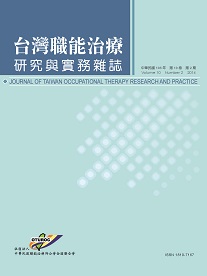Journal of Taiwan Occupational Therapy Research and Practice

半年刊,正常發行
居住在護理之家的中風老人,由於長期的慢性疾病,造成他們在運動、感覺、認知等方面的缺失,因而導致日常生活自我照顧、參與活動等功能的限制與困難。職能治療透過提供老人有意義的職能活動,可以減緩老化及疾病所帶來的影響,盡可能保持老人的健康與獨立性。需求評估(Needs evaluation)是利用訪談及觀察的方式搜集資料,瞭解個案的需求和目標,以期能發展出符合個案之介入計劃,設計符合個案的職能活動,作為發展生活型態再改造計劃的依據。本研究目的是對護理之家的中風老人進行需求評估,了解老人主觀所關注之重要生活議題,做為未來職能治療活動設計方針參考,以提昇他們的健康及生活品質。 受訪的老人共五位,皆為男性,居住在某醫院附設護理之家的住民,年齡從65到85歲,平均年齡為76.2歲,他們都能夠聽懂及講國語。訪談的地點在護理之家的職能治療室內,資料收集時間從95年3月至5月,資料透過一對一訪談方式收集,採開放式的問題,並在訪談的過程中進行錄音,記錄訪談內容。訪談結束後,資料收集者將資料對照錄音記錄作轉錄、歸納及分析,研究結果採用紮根理論(grounded theory)的分析方式來做資料分析。 結果顯示受訪中風老人所關注的重要生活議題可歸納為四個向度,分別是行動能力、自我控制感、社交關係及心理健康。透過呈現受訪老人之描述,可以瞭解在慢性疾病及機構化的影響之下,護理之家住民在這些生活議題當中所遭遇的經驗與感受。 本研究結果有助於了解護理之家中風老人之需求,可作為未來對此護理之家中風老人職能治療計劃之參考。
Elders with stroke who lived in nursing home, due to chronic diseases and confined environmental settings, were at increased risk for a variety of physical and functional deficits that threaten their ability for independence and participation in meaningful activities. Occupational therapy provided meaningful occupations to elders, focusing on preventing illness and disability, promoting their health and independence. Needs evaluation led to clear objectives, which allowed for more effective therapeutic interventions and outcomes. Critical information was gathered by interviews and observations in order to identify goals for the lifestyle redesign program. The present study was designed to document a sample of elders with stroke on their subjective perceptions regarding life domains. It was expected that the needs evaluation became the foundation for the treatment planning of elders, enhancing their health and quality of life. The informants were five Mandarin-speaking older males with stroke who resided in a hospital affiliated nursing home. Their age ranged from 65 to 85 with a mean of 76.2 years. Data were collected through open-ended questions administered by one interviewer who held one-on-one interview sessions. The interviews lasted from March to May in 2006 and were conducted in the occupational therapy department of the nursing home. All interviews were recorded. The data analysis was based on the analysis method of grounded theory. On the basis of interview data, four life domains were identified. The domains were mobility maintenance, self-control, social relationships and psychological well-being. The findings presented a broad picture of experiences and perceptions in the elders' important life domains. These four life domains identified from our data suggested the needs of elders with stroke in nursing home. Occupational therapists may consider them as references for future OT programs for this population.












